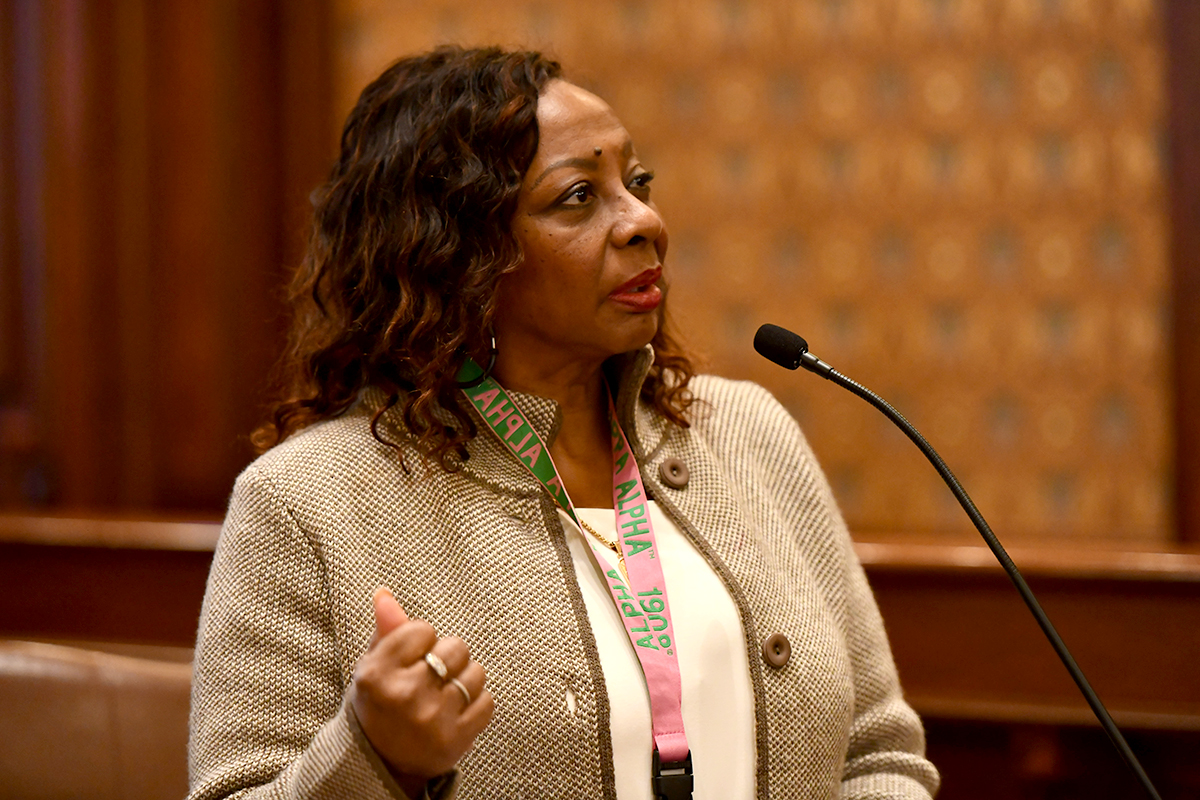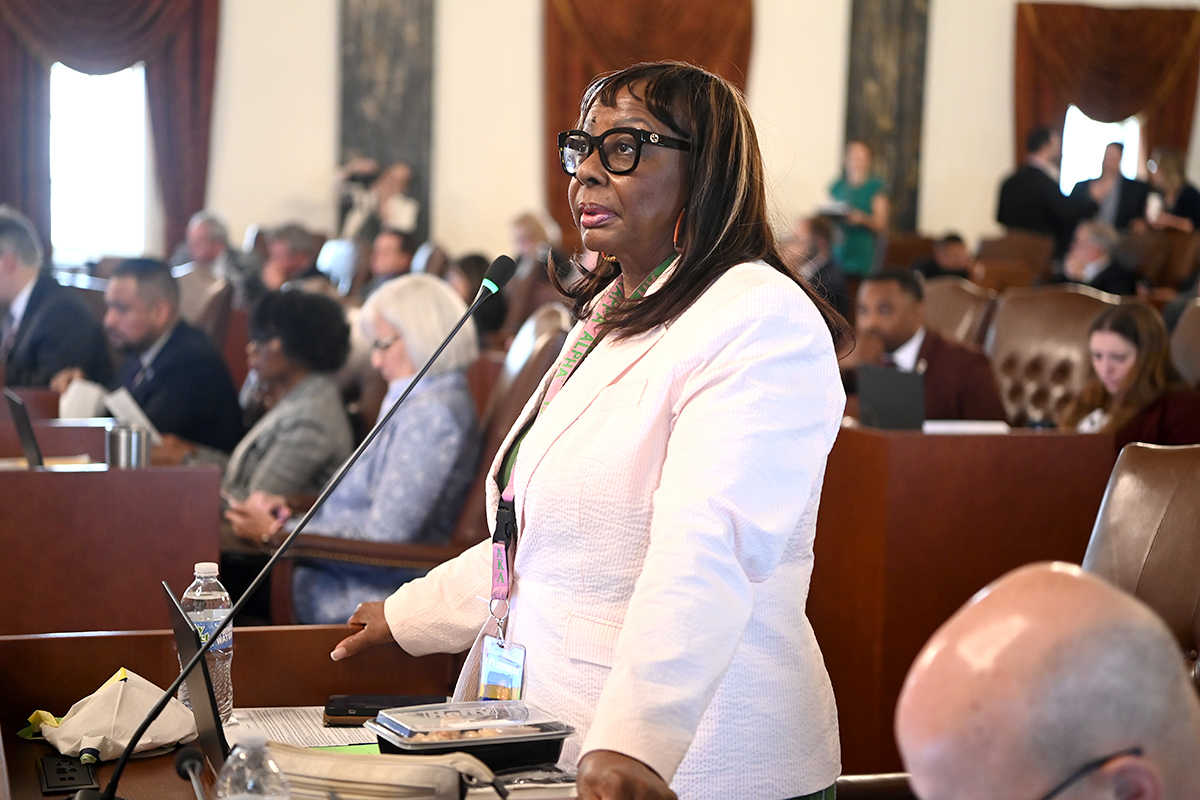Hunter applauds FDA approval of gene therapies for sickle cell disease
- Details
- Category: Press Releases

“The FDA's approval of Casgevy and Lyfgenia to treat sickle cell disease is a significant milestone in our ongoing efforts to improve the lives of those affected by this debilitating condition,” said Hunter (D-Chicago). “This is a testament to the progress we can achieve when we prioritize and invest in medical research."
Sickle cell disease is a group of inherited blood disorders affecting approximately 100,000 people in the United States, most commonly African Americans. In an affected individual, red blood cells — which are normally round and flexible — are sickled-shaped, stiff and sticky, leading to a variety of problems including blocked blood flow, anemia, organ damage and stroke.
The FDA approved two cell-based gene therapies — Casgevy and Lyfgenia — for the treatment of sickle cell disease in patients 12 and older. Both products are made from the patient’s own blood stem cells, which are modified and given back as a one-time, single-dose infusion. Patients who receive either treatment will take part in a long-term study to evaluate each product’s safety and effectiveness.
Hunter has led legislation to improve care for those affected by sickle cell disease, including the creation of the Sickle Cell Prevention, Care and Treatment Program through the Illinois Legislative Black Caucus’ Health and Human Services Pillar. Additionally, she has served on the Red Cross of Illinois Sickle Cell Task Force.
“This treatment offers hope for improved outcomes and a better quality of life for patients,” said Hunter. “I commend the researchers and scientists who worked tirelessly on these advancements and thank the patients and advocates who helped to make the approval of this treatment possible.”
Read more about the treatments on the FDA’s website.
Hunter appointed to Medicaid Managed Care Oversight Commission
- Details
- Category: Press Releases
 SPRINGFIELD — State Senator Mattie Hunter has been appointed co-chair of the state’s Medicaid Managed Care Oversight Commission to ensure Medicaid beneficiaries receive high-quality and affordable care.
SPRINGFIELD — State Senator Mattie Hunter has been appointed co-chair of the state’s Medicaid Managed Care Oversight Commission to ensure Medicaid beneficiaries receive high-quality and affordable care.
“Medicaid is a vital lifeline for many Illinoisans that provides access to essential health care services,” said Hunter (D-Chicago). “This commission will play a critical role in addressing systemic challenges, upholding the integrity of the program and promoting equitable health care access for all Medicaid beneficiaries.”
With Hunter’s leadership, the Medicaid Managed Care Oversight Commission was established through the Illinois Legislative Black Caucus’ Health and Human Services Pillar in 2021.
The commission is tasked with evaluating the effectiveness of the state’s Medicaid program including reviewing health outcome data and diversity contracting goals, expanding care coordination with a focus on social determinants of health, and assessing culturally competent services. The panel will submit an annual report of its findings and recommendations to the General Assembly.
Hunter leads town hall on kidney disease prevention, education efforts
- Details
- Category: Press Releases

Kidney Disease Prevention and Education Task Force members (L-R): Dr. Kalyani Perumal, Dr. Niva Lubin-Johnson, State Senator Mattie Hunter, Jackie Burgess-Bishop, Marion Shuck and Elizabeth Lively.
CHICAGO — State Senator Mattie Hunter, co-chair of the Illinois Kidney Disease Prevention and Education Task Force, spoke at a town hall Tuesday to share the task force’s progress and findings related to the prevention, detection and treatment of kidney disease.
“Kidney disease is largely preventable, yet it remains a leading cause of death in the United States,” said Hunter (D-Chicago). “It is important to ramp up public awareness efforts surrounding risk factors, early detection, living donations and more to help end this health crisis.”
The town hall fostered community awareness and engagement through presentations, panel discussions and Q&A sessions. Members of the health equity, awareness and early detection, dialysis, and transplant and donation subcommittees highlighted research and progress on each topic.
The Kidney Disease Prevention and Education Task Force, created through legislation led by Hunter, is charged with raising public awareness and presenting solutions to reduce the prevalence of kidney disease and racial disparities in diagnoses and outcomes.
“This is a very personal issue to many people, including me — as a teen, I watched the impact this disease had on my mother,” said Hunter. “I am grateful to highlight the work this task force has accomplished as we move toward a more proactive approach to kidney health.”
A second town hall will be held Thursday, Nov. 30 from 1-3:30 p.m. at The Park Church, 801 Concord Ave., Rockford. Virtual attendance is available through Zoom.
Kidney Disease Prevention and Education Task Force holding town hall
- Details
- Category: Constituent Services
 CHICAGO — State Senator Mattie Hunter, co-chair of the Illinois Kidney Disease Prevention and Education Task Force, is inviting the public to a town hall on Nov. 28 where members of the task force will share information related to prevention, detection and treatment of kidney disease.
CHICAGO — State Senator Mattie Hunter, co-chair of the Illinois Kidney Disease Prevention and Education Task Force, is inviting the public to a town hall on Nov. 28 where members of the task force will share information related to prevention, detection and treatment of kidney disease.
The Kidney Disease Prevention and Education Task Force, created through legislation led by Hunter in 2020, is charged with raising public awareness and presenting solutions to reduce the prevalence of kidney disease and racial disparities in diagnoses and outcomes. Members of the awareness and early detection, dialysis, and transplant and donation committees will offer brief reports of information related to each topic followed by a panel discussion.
Attendees can fill out a witness slip online prior to the event, and remarks will be allowed on a first-come, first-served basis. Questions will be answered during a Q&A portion following the panel discussions.
The event will be held Tuesday, Nov. 28 from 10 a.m. to 12:30 p.m. at AKArama Foundation, 6220 S. Ingleside, Chicago. Virtual attendance is available on Zoom.
More Articles …
Page 17 of 143


